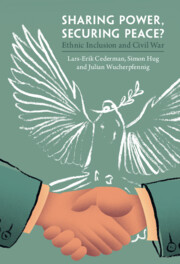Book contents
- Frontmatter
- Contents
- Figures
- Tables
- Preface
- 1 Introduction
- Part I Theories and Concepts
- 2 Power Sharing and Conflict in the Literature
- 3 Key Concepts and Arguments of Our Approach
- Part II Analyzing the Effect of Power Sharing on CivilWar
- Part III Power Sharing and Civil War in Time and Space
- Bibliography
- Index
2 - Power Sharing and Conflict in the Literature
from Part I - Theories and Concepts
Published online by Cambridge University Press: 23 June 2022
- Frontmatter
- Contents
- Figures
- Tables
- Preface
- 1 Introduction
- Part I Theories and Concepts
- 2 Power Sharing and Conflict in the Literature
- 3 Key Concepts and Arguments of Our Approach
- Part II Analyzing the Effect of Power Sharing on CivilWar
- Part III Power Sharing and Civil War in Time and Space
- Bibliography
- Index
Summary
Given the huge number of writings covering power sharing in general, and its relationship to internal conflict in particular, it is essential to summarize what has been written in order to position the current work in this context. Thus, the first half of the chapter offers a straightforward overview of the relevant literatures. While this summary pays attention to conceptual issues and how the literature has analyzed the consequences of power sharing in broad terms, the primary focus is on conflict. Proceeding chronologically, the chapter starts with an account of the central divide in comparative politics between those perspectives that endorse power sharing, and those that oppose it. We retrace this classical divide back to the early writings of Lijphart, who introduced his consociational approach to stable democracy in divided societies in opposition to majoritarian democracy as practiced in Anglo-Saxon countries. The review of the literature covers its main stages together with work by other scholars working within this tradition as well as its main critics, including most prominently Horowitz, Rothchild and Roeder, and more recently research by Gates, Strøm and others. We then turn to the literature on post-conflict agreements. A section summarizing the main arguments for and against power sharing follows. The chapter ends with a discussion of the four challenges identified in Chapter 1.
Keywords
- Type
- Chapter
- Information
- Sharing Power, Securing Peace?Ethnic Inclusion and Civil War, pp. 9 - 22Publisher: Cambridge University PressPrint publication year: 2022



